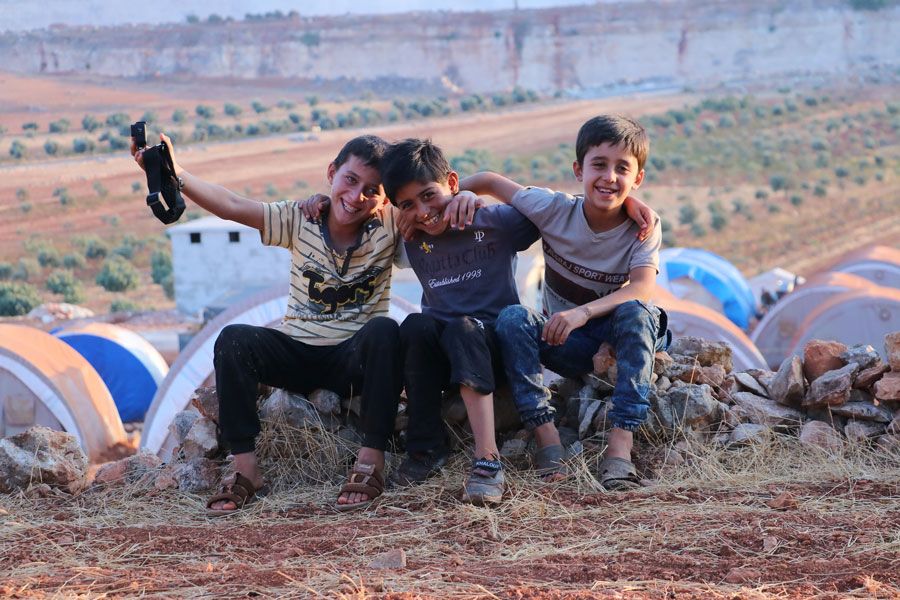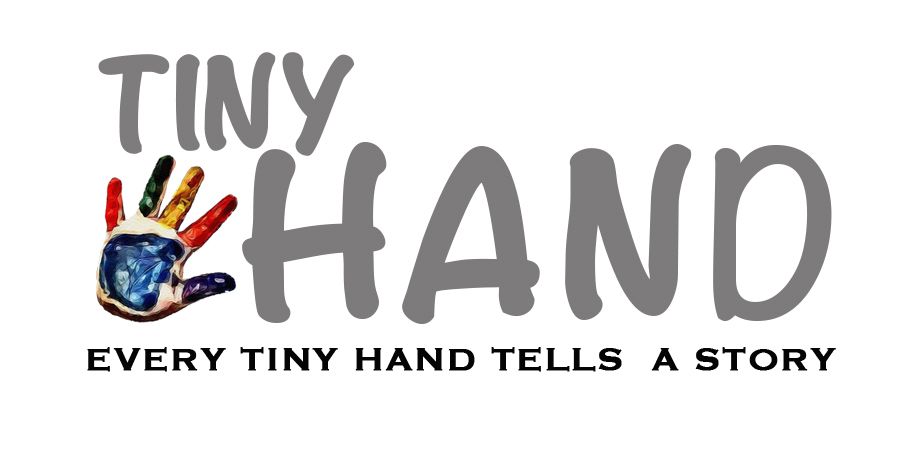At This Moment, You’re a refugee Child
360 “Normal” Days in “Abnormal” Place
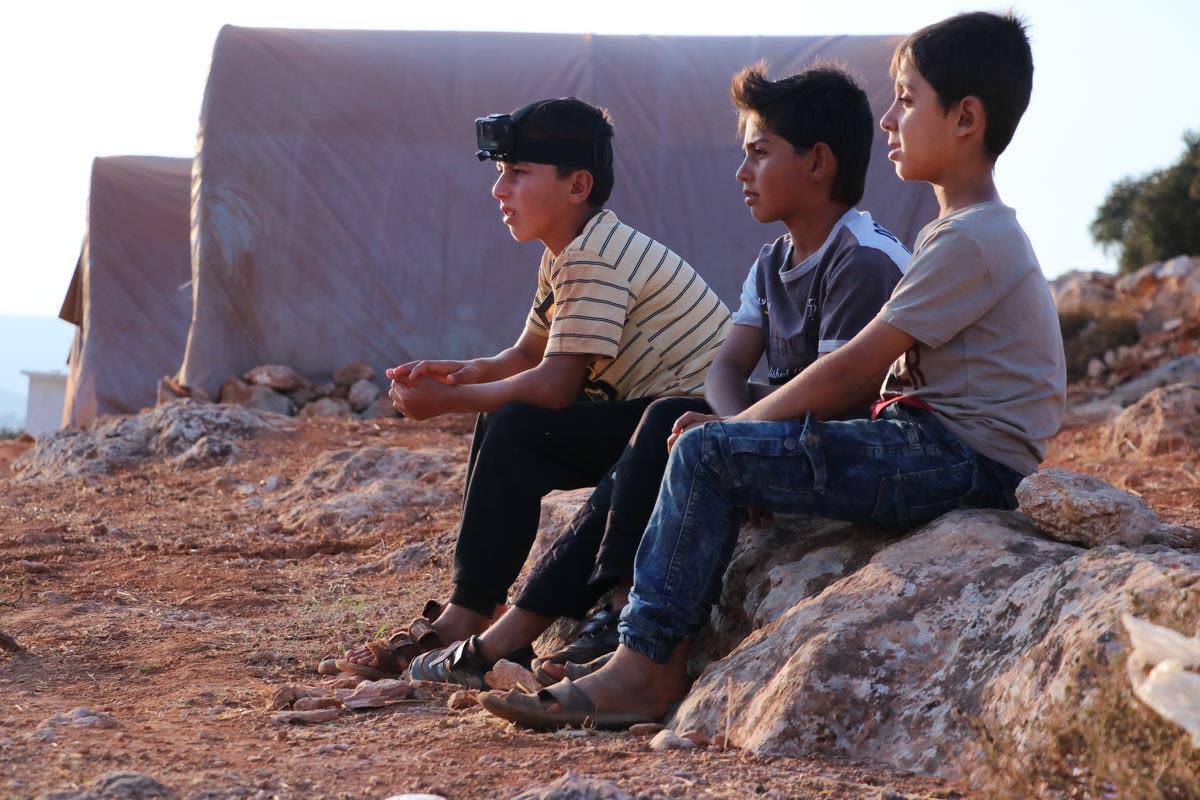
What does it mean to live 360 days in a place having neither schools nor markets — literally nothing except dust, dirt, and of course, tents?
Perhaps you are one of those who believe they will never find themselves in a place like this, just as Abdulrazzaq, a Syrian child, had thought.
Only one year ago, Abdulrazzaq used to live, like you in a house, sleeps on a bed, goes to his school in Idlib countryside, plays with his friends, and receives decent education to become a journalist when he grows up one day.
Although Abdulrazzaq lost his home, school, and friends, he still cherishes his dream of becoming a journalist even more fondly than ever before.
He carried a small camera on his head and began documenting moments of his life in a camp in Idlib countryside.
This is the place to which Abdulrazzaq took us on a one-year-long journey.
Summer, 2019
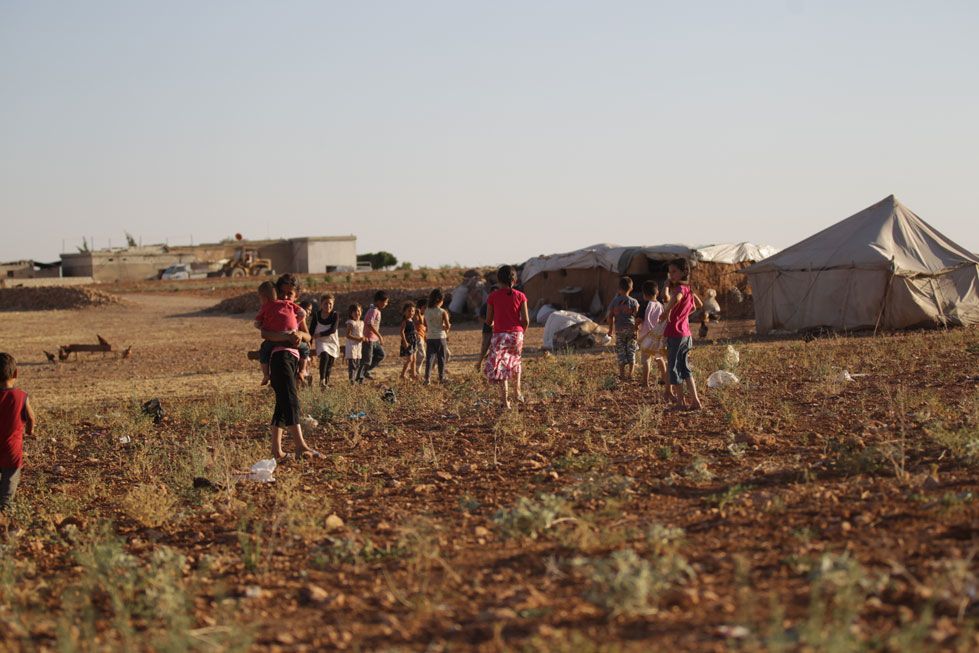
Neither discussions nor words forced Abdulrazzaq’s father to arrive at the decision of displacement from their home. Rather, he made this major decision to escape from the intensified bombs dropped on their hometown.
He is a 40-year-old man who could not tolerate any more to watch his children trembling in fear every time they hear the awful noise of warplanes and seeking protection by taking shelter under blankets despite summer’s burning heat.
At that night, Abdulrazzaq, his six siblings, and parents packed their belongings and set out on their journey heading to a camp in northern Idlib.
“It was a dark night.” This is all that Abdulrazzaq could recall about that night. He continued to repeatedly ask himself questions to which he could not find answers until today: “Why did this happen to us? Why did we leave our house to live in a tent?”
Then came the second shock Abdulrazzaq got.
Upon the family’s arrival in the early morning hours, they could not find a place to shelter them. “My father had to buy a tent,” narrated Abdulrazzaq.
Even getting a small tent meant paying for it.
"My father felt a mixture of anger and fear trying to find an answer to this question: ‘How could that tent meet our needs?’" Abdulrazzaq added.
This same question haunted the minds of about 200 Syrian families who were displaced during that summer to this miserable place. Later, Abdulrazzaq met his friends, Abdel Nasser and Hassan, at the camp.
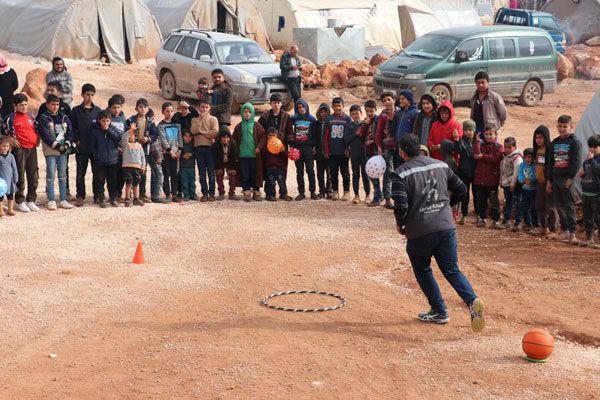
Members from Syrian Child Protection Network (Hurras) paid a visit to the camp. At this same place, the camp children, including Abdulrazzaq and dozens of others, played, laughed, and exchanged lengthy talks about what they had gone through. They were in a desperate need of psychological support. This need was what gave Abdulrazzaq the inspiration for using the camera to document life inside a camp.
But this time, the cameraperson is a child rather than a grown-up journalist.
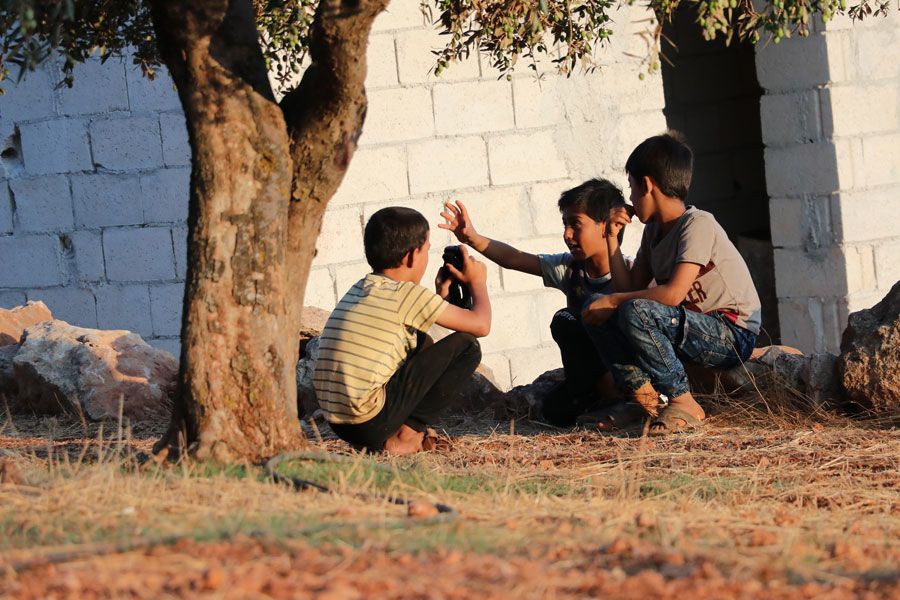

عبدالرزاق وحسن وعبدالناصر
عبدالرزاق وحسن وعبدالناصر
First Scene: A Summer Day
Whoever watches the many shots filmed by Abdulrazzaq would think for a moment that there is a technical error that repeats them with a slight difference in the scenario.
But the truth is, tens of hours in the camp seem very much alike — the same place, the same clothes, and the same faces. Even the food they eat is the same every day except in few occasions.
First Shot: 7:30 a.m.
Although the GoPro camera he used has a wide-angle lens, this feature remains almost idle because of the small size of the tent he lives in.
There, you will find a plastic bucket Abdulrazzaq uses to wash his face before going out to look for his friends, Abdel Nasser and Hassan, even before eating his breakfast.
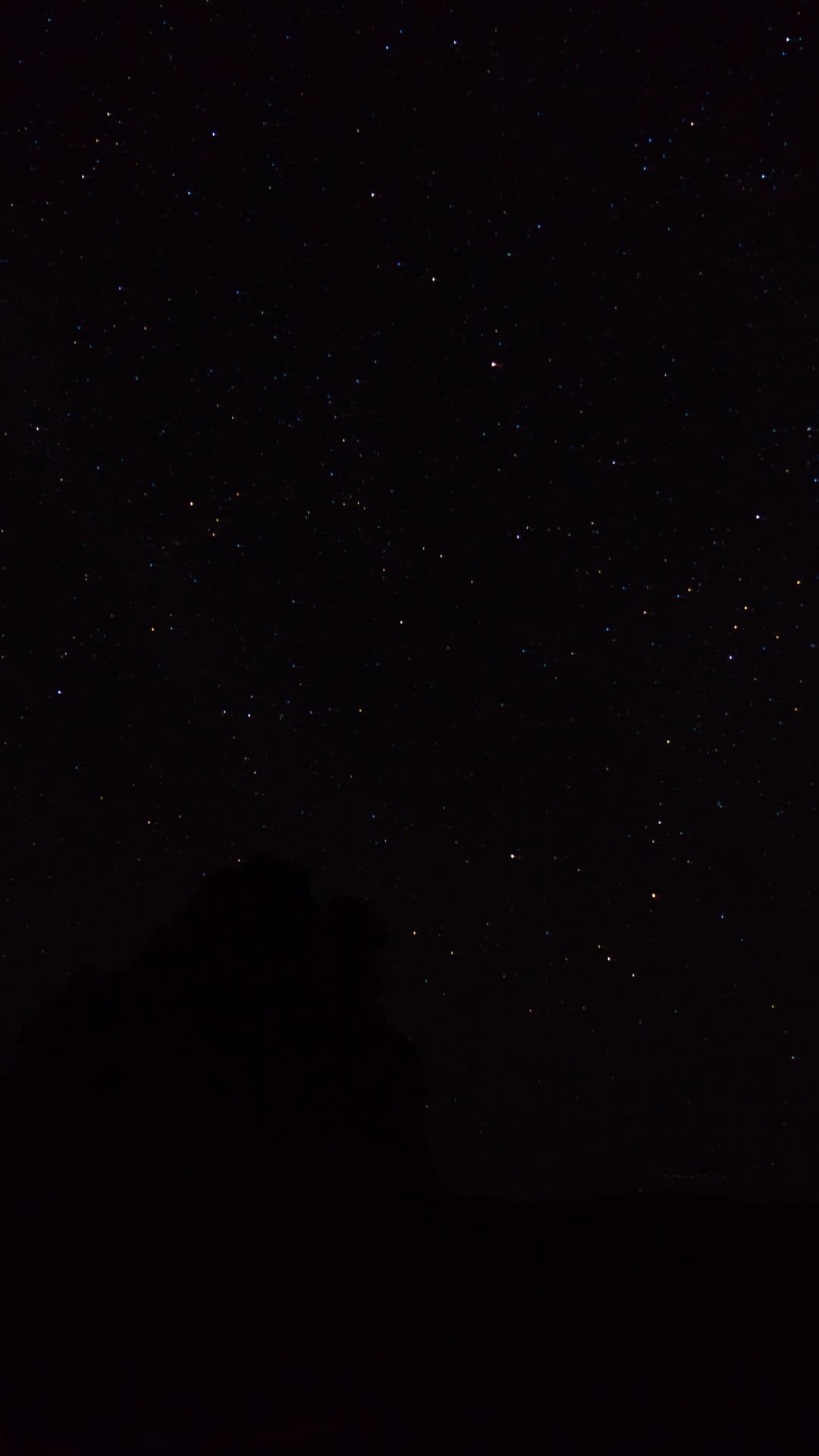

What are you doing?
building a tomb!
Perhaps the impact of that answer will be "shocking" for those who receive it immediately after the morning greeting.
But this was not the case for Abdulrazzaq, because he knows what his friends had exactly gone through before they arrived at this camp.
He even decided to give them a hand in building this tomb
Second Shot: 10 a.m. - 3 p.m
Abdulrazzaq does not ask his mother the typical morning question of many children: "What are we going to have for breakfast or lunch today?" He just washes his hands and sits beside his family members on the ground to eat.
They eat the same meal every day, especially that the value of the Syrian pound has collapsed and the prices of commodities in the markets increased (1 US dollar equals around 1,700 Syrian pounds).
Abdulrazzaq has never complained about his daily meals or the lack of water in any of his recordings. On the contrary, his father told us his 10-year-old son has immense worries because he is always concerned about his siblings. The child is also angry to see his parents sad about the conditions they have been experiencing.
Abdulrazzaq finishes his meal every day at the same time to resume playing with his two friends.



Since the activities available inside the camp are almost nonexistent, children have nothing to play with except stones and rocks on the ground. They resort to storytelling and each of them tell an imaginary story.
Now, it is Hassan’s turn to narrate his story.
Once Upon a Time....
Nothing interrupts the companions’ stories or stone games except the warplanes’ noise. The children have gained extensive expertise in the positions these planes take before dropping bombs. They acquired such expertise because their hometown and school were bombed by destructive air raids.
Today, after nearly ten years of war, two in five schools in Syria have been damaged or completely destroyed, according to UNICEF.
Consequently, more than two million children no longer attend schools; that is, one-third of Syria’s child population is out-of-school including Abdulrazzaq and his two friends.
Until the summer of 2019, the camp did not have a school. This situation will change later in the winter of 2020, but it will not continue to exist due to the fear of the outbreak of Coronavirus.



Third Shot: 7 p.m
Only the sun announces the end of the three companions’ day because the place has no electricity. As soon as the sun begins to set, each of the three friends will go to his tent.
They do not even say goodbye to each other or discuss what they will do the next day or where they will meet.
Today is no different from yesterday and tomorrow, until winter came bringing with it worries of another kind.
However, the opening of a school in the camp somehow reduced the burden of these worries.

Second Scene: A Winter Day
First Shot: 7:30 a.m., Winter, 2020
Today, Abdulrazzaq will meet his two friends not to play together, but to go to a school donated by someone.
Despite its simplicity and the small amount of money funding it, this tent school was capable of spreading positive energy among the camp children.
Unlike many children, they will neither cry on the first day of school nor complain about attending classes. It is perhaps because they realize what it means to lose their school and to be lucky to have it back.
This is exactly what Abdulrazzaq felt. His father told us that his child was a diligent student. “My son was about to experience an episode of depression because he stopped going to school,” the father said.
Second Shot: 4 p.m., Winter, 2020
Time flies in the camp. Days go by without you feeling them. You are preoccupied with the simple details imposed by this primitive life. You are busy learning how to start a fire, wash your clothes, or how to wipe dirt residue off your shoes.



Last Shot: Coronavirus, Winter, 2020
It is not only war that can treat you cruelly. A disease, too, can stand in your way. The global COVID-19 outbreak led to the shutdown of schools in the areas controlled by the Syrian opposition.
Of course, Abdulrazzaq’s school was one of them.
Today, he yearns for the camp school, his village school, and his village. In short, he longs to return to a normal life!
Until today, no cases of COVID-19 have been reported in the province of Idlib which is home to over 3 million people. However, there is growing concern over the possible spread of the virus in the densely-crowded camps.
Concerns are rising that the pandemic could set off a humanitarian crisis in Idlib which lacks the appropriate medical care as a result of the destruction of the medical sector caused by the nine-year war.

Abdulrazzaq continues to film documentary shots about his life in the camp until this moment while eagerly awaiting with his friends to leave the place.
The question that the three companions have frequently repeated in the video clips and to which they have not yet received an answer is: “When will we depart from this camp?”
“This was our friend, Abdulrazzaq, who was filming us, and we wish you best of luck and happiness.”
